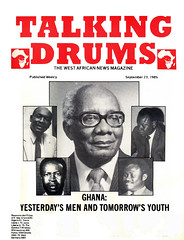'Dancing (the devaluation hi-life) in the street'
A Touch Of Nokoko
By Kofi Akumanyi
However, we cannot say the same for dear old Africa where the 'action' really is, for quite obvious reasons. Economic matters of much heavier portend have produced feet shuffling and stomping of a different kind. In Nigeria, for instance, the issue has taken a turn for the better, some say, with the appointment of a man who is believed to possess the magic wand to produce the type of hit song that the whole country can dance to happily ever after.
It is in this light that the appointment of Dr Kalu Kalu as Minister of Finance by Maj-General Babangida must be considered. Dr Kalu Kalu was an Economist with the World Bank and supports accepting conditions, including the devaluation of the naira as laid down by the International Monetary Fund for a 2.2 billion dollars (£1.8 billion) loan. It may be recalled that negotiations with the IMF have stalled for two years because the ousted Buhari regime refused to accept the conditions.
To be sure, General Buhari and governments before him, to a lesser extent, have been doing what has come to be referred to in entertainment circles as the 'Devaluation Waltz' to the annoyance of many who felt that considering the country's political and Social make-up they needed something more lively than the "one-step for- ward, one-step backwards, side-step, side-step," with which the government was agonisingly tantalising the population as the oil wealth shrank before their eyes.
Of course, the opposers of devaluation themselves have been "singing" and "dancing" for quite some time. The latest rendition has come from a one-time Federal Commissioner for Labour, Major-General Henry Adefowofe (rtd) who said that IMF loans have negative economic effects on the nation. "Removal of petroleum subsidy, he said, "which the loan demanded would, among other things, lead to a transport fare hike and general inflation in the open market, thereby, making it meaningless to the average Nigerian."
Without a shadow of doubt the public debate would go on for a long time and as the ordinary man in the street who has no clue as to what all that devaluation hullabaloo is about patiently waits with bated breath for a solution from the new minister's office.
In such controversial issues, I usually ask an eminent authority in the field to throw more light on them and in this particular instance it is for the benefit of those who need to make up their minds which type of on devaluation dance, highlife, tango or waltz - they would prefer.
As usual, the first man contacted to talk to this columnist could not refuse. Professor Moussa Dongomi, of one of the Nigerian Universities (name withheld on request) who is in London for an international seminar was so pleased to talk about this topic which, he said, prior to the repeal of Decree 4, no Nigerian newspaper would publish. The following are excerpts from the wide-ranging interview on the Nigerian economic situation.
"Why are Nigerians so afraid of devaluation?"
"We are NOT afraid of devaluation! Nigerians do not know what fear is. "Professor Dongomi emphasised.
"O.K. let me rephrase the question. Why is it taking Nigeria so long to do the obvious thing - devalue the naira in the face of mounting economic problems?"
"Well, the answer can be given in many layers and the first obstacle, it seems to me, is the intransigence of the political leadership. It is afraid of losing its popularity if it brings the economic hardships which devaluation is sure to bring… " said Prof Dongomi. "
"But, Prof. Nigeria's economy cannot be worse than that of Ghana but the military without batting an eyelid devalued the cedi and promptly lost public support, so why can't they do the same?"
"You are right, except that you've forgotten that devaluation has been scientifically proven to go better with cocoa than other things."
"I didn't know about that. I have been led to believe that the American dollar and the naira float much better on oil than any other mineral." I countered.
"Well, you have a lot to learn, my boy! You have a lot to learn. Oil has a funny property which you obviously do not know."
"What is it?"
"It floats money only when there is plenty of it. As soon as its quantity reduces it loses its buoyancy and sinks anything that is supported by it," said Prof Dongomi.
"Are you talking about the naira or oil?"
"Oil of course."
"How can Nigeria get out of this one now that her oil reserves are estimated to be going down?"
"Simple, stop counter-trade, devalue the naira and dig in her feet for a period of long, long, suffering which would eventually bring prosperity."
"I thought you opposed devaluation. Anyway, if Buhari and his predecessors could not do it, why do you think this government can?" I asked him.
"I can't do it without proper preparation towards that end."
'What's your formula?"
"You know that we Africans love music and dancing. To make the need for devaluation of the naira sink deep into the body politic, the government has to commission a song writing contest from the country's top popular bands."
"To what end?"
"It will help expand public energy and thereby allow Dr Kalu Kalu to work out the solutions to the issues in peace."
"What will you call it?"
"The Devaluation Highlife Committee!"
